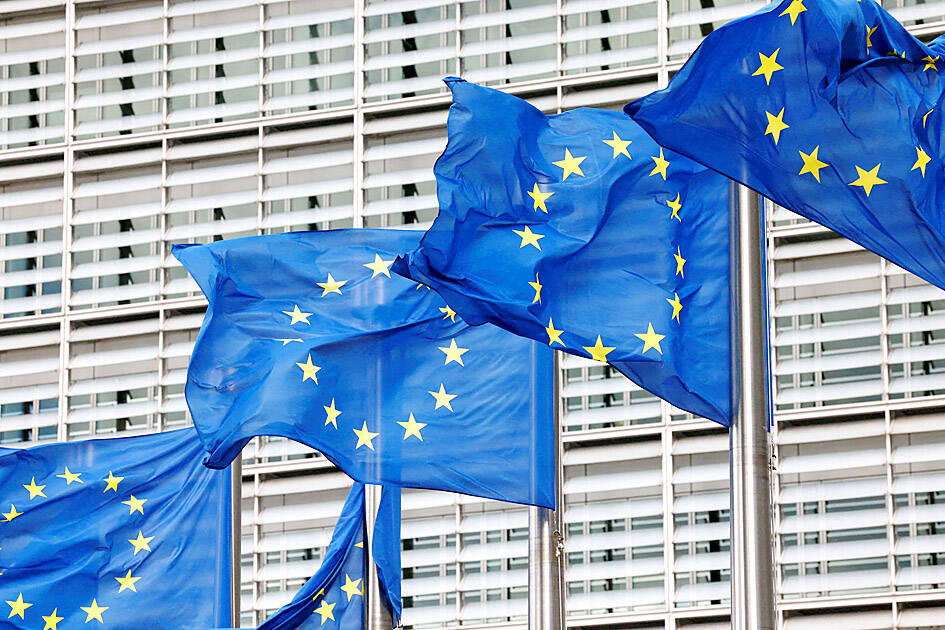The EU yesterday agreed to create a trade tool aimed at punishing countries that seek to put pressure on one of its member countries, after China targeted Lithuania.
The new weapon would allow the 27-nation bloc to impose tariffs, restrict investment and limit access to public contracts for nations seen as engaging in economic blackmail.
“This sends a strong signal that the EU rejects all forms of economic coercion,” European Commissioner for Trade Valdis Dombrovskis said. “We’ll be more assertive in defending our legitimate rights and interests.”

Photo: Reuters
The push to bulk up the EU’s economic muscle was given impetus by a row with China over trade restrictions imposed on EU member Lithuania after it strengthened ties with Taiwan. The EU has started action against leading trade partner China at the WTO over the restrictions.
Beijing has denied taking coercive measures.
The new instrument was agreed between EU member states and lawmakers after a year of negotiations. It is expected to enter into force later this year after it is formally approved by the European Parliament and 27 EU countries.
“It is one more tool at the service of our strategy for a less naive European trade,” French Minister Delegate for Foreign Trade, Economic Attractiveness and French Nationals Abroad Olivier Becht said.
Divisions between EU members have typically hampered the bloc from flexing its collective economic might on the international stage.
The tool now hands more powers to the EU executive arm, the European Commission, but unleashing the economic punishment would be only a last-ditch nuclear option if attempts at mediation fail.
In practice, EU member states would report complaints to the commission, which would have four months to rule if coercion is involved.
Any decision would then need to be signed off by a qualified majority of EU countries. If they agree, a mediation phase would begin during which the commission would seek to convince the third country involved to end its objectional measures.
Only if that does not work would the EU be able to resort to its new powers.

Intel Corp chief executive officer Lip-Bu Tan (陳立武) is expected to meet with Taiwanese suppliers next month in conjunction with the opening of the Computex Taipei trade show, supply chain sources said on Monday. The visit, the first for Tan to Taiwan since assuming his new post last month, would be aimed at enhancing Intel’s ties with suppliers in Taiwan as he attempts to help turn around the struggling US chipmaker, the sources said. Tan is to hold a banquet to celebrate Intel’s 40-year presence in Taiwan before Computex opens on May 20 and invite dozens of Taiwanese suppliers to exchange views

Application-specific integrated circuit designer Faraday Technology Corp (智原) yesterday said that although revenue this quarter would decline 30 percent from last quarter, it retained its full-year forecast of revenue growth of 100 percent. The company attributed the quarterly drop to a slowdown in customers’ production of chips using Faraday’s advanced packaging technology. The company is still confident about its revenue growth this year, given its strong “design-win” — or the projects it won to help customers design their chips, Faraday president Steve Wang (王國雍) told an online earnings conference. “The design-win this year is better than we expected. We believe we will win

Quanta Computer Inc (廣達) chairman Barry Lam (林百里) is expected to share his views about the artificial intelligence (AI) industry’s prospects during his speech at the company’s 37th anniversary ceremony, as AI servers have become a new growth engine for the equipment manufacturing service provider. Lam’s speech is much anticipated, as Quanta has risen as one of the world’s major AI server suppliers. The company reported a 30 percent year-on-year growth in consolidated revenue to NT$1.41 trillion (US$43.35 billion) last year, thanks to fast-growing demand for servers, especially those with AI capabilities. The company told investors in November last year that

Power supply and electronic components maker Delta Electronics Inc (台達電) yesterday said it plans to ship its new 1 megawatt charging systems for electric trucks and buses in the first half of next year at the earliest. The new charging piles, which deliver up to 1 megawatt of charging power, are designed for heavy-duty electric vehicles, and support a maximum current of 1,500 amperes and output of 1,250 volts, Delta said in a news release. “If everything goes smoothly, we could begin shipping those new charging systems as early as in the first half of next year,” a company official said. The new